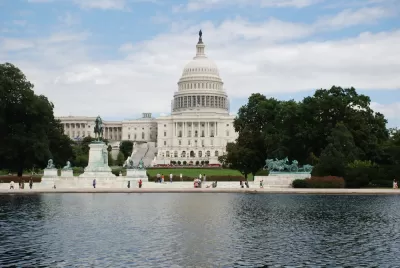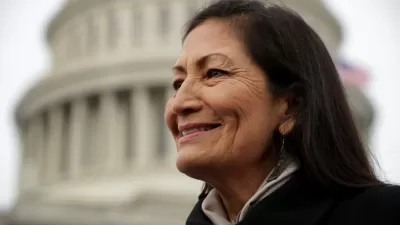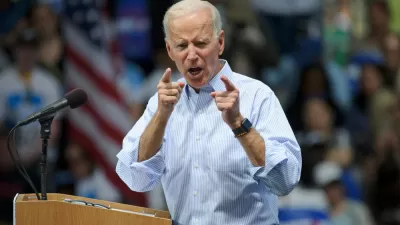Sen. Edward J. Markey (D-Mass.) and Rep. Alexandria Ocasio-Cortez (D-N.Y.) introduced a House resolution to tackle climate change that calls for the nation to become carbon neutral by 2030, an ambitious goal, but is it realistic?

On Thursday, the Green New Deal transitioned from slogan to a 14-page document [pdf] in the form of an as-yet unnumbered, nonbinding House resolution introduced by Sen. Edward J. Markey (D-Mass.) and Rep. Alexandria Ocasio-Cortez (D-N.Y.). Ten years ago, Markey, as a congressman, co-authored legislation, known as the Waxman-Markey bill, that would have established a cap-and-trade program for carbon emissions. It narrowly passed the House but was never heard in the Senate.
The Green New Deal calls for the country to become carbon neutral by 2030, "one of those things that a lot of experts say is not only ambitious, but almost impossible to pull off," NPR political editor Domenico Montanaro tells NPR's Morning Edition host, Steve Inskeep, on Thursday.
Experts shoot for more like 2050, and that's considered ambitious. It would also eliminate most, if not all, air travel, in fact, because of how it wants to restructure things like high-speed rail - so very ambitious - not a lot of specifics as far as how to get to those things, but certainly laying down a marker for where liberals want to go in addressing climate change. [More commentary from Montanaro, with audio, here.]
Dino Grandoni and Jeff Stein report on some of the provisions in the far-reaching resolution for The Washington Post (source article):
Their proposal stipulates that any infrastructure deal struck with President Trump and other Republicans must address climate change, such as by building resilience to extreme weather events. It gives progressives something many of them have been itching for: The promise of a guaranteed high-paying job for every American.
But one crucial thing the proposal does not spell out: How the federal government is expected to pay for or achieve these broad aims.
The Green New Deal would be paid for “the same way we paid for the original New Deal, World War II, the bank bailouts, tax cuts for the rich and decades of war — with public money appropriated by Congress,” Ocasio-Cortez said, according to the Associated Press.
The proposal was applauded by the Sierra Club. "These Green New Deal resolutions offer a bold plan to tackle the climate crisis and inequality -- two of the defining crises of our time -- at the speed and scale that science and justice demand," said Executive Director Michael Brune.
However, according to Chris Cillizza of CNN, House Speaker Nancy Pelosi (D-San Francisco) initially appeared dismissive of the resolutions, although Ocasio-Cortez rejected that categorization in the CNN video that accompanies the article.
Asked about the "Green New Deal" in an interview with Politico on Wednesday, Pelosi dropped this amazing bit of shade on it:"It will be one of several or maybe many suggestions that we receive. The green dream, or whatever they call it, nobody knows what it is, but they're for it, right?"
Pelosi, who as speaker in 2009 guided the Waxman-Markey bill to passage in the House, has a very strong climate agenda as well. Also on Thursday, she announced the nine members to the new Select Committee on the Climate Crisis, led by Kathy Castor, a seven-term representative from Tampa Bay. Ocasio-Cortez was invited to serve, "but she opted against it because she’s already on an Oversight and Reform subcommittee on the environment," reports Lindsey McPherson for Roll Call.
FULL STORY: The Energy 202: Ocasio-Cortez, Markey unveil Green New Deal with backing of four presidential candidates

Alabama: Trump Terminates Settlements for Black Communities Harmed By Raw Sewage
Trump deemed the landmark civil rights agreement “illegal DEI and environmental justice policy.”

Planetizen Federal Action Tracker
A weekly monitor of how Trump’s orders and actions are impacting planners and planning in America.

How Atlanta Built 7,000 Housing Units in 3 Years
The city’s comprehensive, neighborhood-focused housing strategy focuses on identifying properties and land that can be repurposed for housing and encouraging development in underserved neighborhoods.

In Both Crashes and Crime, Public Transportation is Far Safer than Driving
Contrary to popular assumptions, public transportation has far lower crash and crime rates than automobile travel. For safer communities, improve and encourage transit travel.

Report: Zoning Reforms Should Complement Nashville’s Ambitious Transit Plan
Without reform, restrictive zoning codes will limit the impact of the city’s planned transit expansion and could exclude some of the residents who depend on transit the most.

Judge Orders Release of Frozen IRA, IIJA Funding
The decision is a victory for environmental groups who charged that freezing funds for critical infrastructure and disaster response programs caused “real and irreparable harm” to communities.
Urban Design for Planners 1: Software Tools
This six-course series explores essential urban design concepts using open source software and equips planners with the tools they need to participate fully in the urban design process.
Planning for Universal Design
Learn the tools for implementing Universal Design in planning regulations.
Jessamine County Fiscal Court
Caltrans
Institute for Housing and Urban Development Studies (IHS)
City of Grandview
Harvard GSD Executive Education
Toledo-Lucas County Plan Commissions
Salt Lake City
NYU Wagner Graduate School of Public Service





























